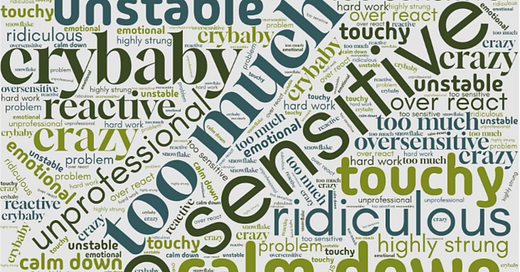Exploration: Part 1 Dealing with our super sensitivity to criticism aka Rejection Sensitivity Dysphoria
When a slight of any kind (real or imagined) feels like a gut punch
Want to listen to me read this to you? Scroll to the end.
I’ve divided this Exploration into two parts for ease of access. Here in Part 1 we look at why we’re so incredibly sensitive to criticism, real or perceived, and the term for it – Rejection Sensitivity Dysphoria (RSD).
In Part 2 we explore a range of strategies to deal with an attack (because it does feel like an onslaught) of RSD in the moment it’s happening, as well as what we can do to reduce the severity of our experience of RSD in the future.
Dealing with our super sensitivity to criticism aka Rejection Sensitivity Dysphoria Part 1
Rejection Sensitivity Dysphoria, also known as RSD, describes the acutely intense reaction we have when we feel rejected or criticised, when we think someone will withdraw their friendship, love or approval, or if we think we messed up or failed. Whether it’s real or perceived, it feels the same to us.
RSD doesn’t happen without a trigger, there’s always something that lights the touchpaper, and our reaction is instant, it feels like it overtakes us and we have no control over it. As well as experiencing strong emotions, shame being the overwhelmingly powerful one, it can also feel physically painful with our bodies tensing and clenching. It evokes phrases like ‘gut punch’ and ‘knife to the heart’.
We can respond by going inward where we berate ourselves, our mood plummets and we become anxious. Or we can externalise by bursting into tears, shouting, throwing things, saying things we might later regret, slamming doors and storming off.
Mentally we leap into overthinking and ruminating over what the other person’s words, look on their face or their tone of voice meant, catastrophising all the ways this could mean terrible things for us. The thoughts about ourselves and our lives which we fear the most can be the ones we think of when our RSD is triggered.
Experiencing RSD is awful. The Greek word ‘dysphoria’ means ‘unbearable’ and our sensitivity makes rejection, real or imagined, by another person feel unbearable.
And it’s super common in those of us with ADHD brains!





